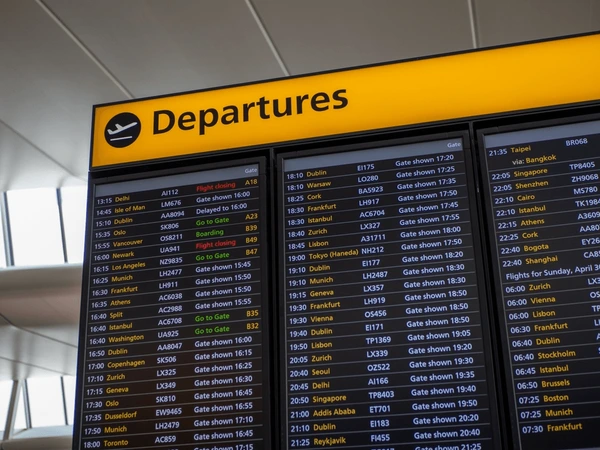We’re letting you know that this post contains sponsored links which Your Savvy Purse receives compensation for, which may impact their order of appearance.
Traveling by air can be a breeze—until it’s not. If you’ve ever experienced a flight cancellation or a significant delay, you know how quickly things can go from exciting to stressful. Whether it’s a weather issue, mechanical problem, or operational delays, these disruptions are unfortunately a part of air travel. However, the good news is that you don’t have to just sit there and worry! There are practical steps you can take to manage the situation, minimize your stress, and get your journey back on track.
If your flight has been canceled or delayed, here’s exactly what you need to do to stay calm, get the help you need, and ensure you’re treated fairly by the airline.
1. Stay Calm and Assess the Situation
Before you do anything, take a deep breath. It’s easy to feel frustrated or anxious, but staying calm will help you think clearly and make better decisions. First, check the flight information screens to confirm the status of your flight. Sometimes the information at the gate might not be updated right away, so if you’re unsure, double-check the airline’s website or app.
2. Check for Alerts or Notifications from the Airline
Most airlines will notify you immediately if there’s a major disruption to your flight. Look out for emails, texts, or push notifications from the airline’s app about the cancellation or delay. If you haven’t received anything yet, make sure you’re signed up for flight alerts. These can keep you informed of any changes directly through your phone.
3. Head to the Airline’s Customer Service Desk (or Call)
Once you know your flight has been delayed or canceled, go to the airline’s customer service desk as soon as possible. In some cases, they may be able to help you get rebooked quickly. Lines at customer service can get long, so if you’re not near a desk, you can also try calling the airline’s customer service number (which can often be found on their website or app). Many airlines also offer online rebooking tools, so you may be able to handle things from your phone without waiting in line.
If you’re calling, be prepared for long hold times, but don’t hang up. A representative will help you explore your options, whether it’s booking you on a different flight or helping you with your next steps.
4. Know Your Rights: What You’re Entitled To
It’s important to understand your rights as a passenger when your flight is delayed or canceled. Airline policies vary depending on the situation, so knowing what you’re entitled to can help you advocate for yourself.
- For Delays:
- Short Delays (less than 2-3 hours): If your flight is delayed for a few hours, airlines typically don’t offer compensation. However, they may provide you with meal vouchers if the delay is significant (usually over 4 hours).
- Long Delays (more than 3 hours): If the delay exceeds 3 hours, especially due to issues under the airline’s control (like mechanical problems or staffing shortages), airlines are often required to provide compensation, such as meal vouchers, accommodations (if you need to stay overnight), or even cash or miles in some cases.
- For Cancellations:
If your flight is canceled, the airline must offer you the option to rebook on a different flight (either with them or with another carrier), refund your ticket, or provide alternative travel arrangements, such as a bus or train. If the cancellation is within the airline’s control (e.g., crew shortages, mechanical issues), they may also be required to offer compensation such as meals or a hotel stay if necessary.
EU passengers: If you’re flying within the European Union, or flying from the EU to other destinations, you’re protected under EC 261/2004. This regulation entitles you to compensation if your flight is delayed or canceled, depending on the length of the delay and the reason behind it.
5. Consider Alternative Routes or Airports
If your flight is canceled and no immediate rebooking options are available, you can ask the airline about alternative routes. This might involve a longer layover, a different connecting flight, or flying to a nearby airport. If there’s no direct flight available soon, check to see if you can be routed through a major hub where more flights are available.
Pro Tip: You can also consider booking your own alternative flight through a different airline or from a different airport if you’re in a time crunch. Make sure to keep all your receipts, as the airline may reimburse you if they’re responsible for the disruption.
6. Keep Track of Your Expenses
While you’re in limbo, keep track of any extra expenses you incur due to the delay or cancellation, such as meals, hotel stays, or transportation. In many cases, the airline may reimburse these costs, especially if the cancellation or delay was within their control. Be sure to keep all receipts, as you’ll need them when you request reimbursement.
7. Understand Your Options for Compensation
If your flight has been significantly delayed or canceled, you may be entitled to compensation depending on the airline’s policies, your destination, and the cause of the delay. Here’s a basic guideline:
- Rebooking: If the airline can’t get you on a flight soon, they should offer you another flight, often at no additional cost.
- Refunds: If you no longer wish to fly because of the cancellation or delay, you have the right to a refund for the unused portion of your ticket.
- Meal or Hotel Vouchers: If you’re stuck at the airport for an extended period or need to stay overnight, many airlines offer meal or hotel vouchers to help cover your expenses.
To maximize your compensation or reimbursement, be polite and patient with the airline staff, but firm in asking for what you’re entitled to.
8. Use Travel Insurance (If You Have It)
If you’ve purchased travel insurance, now’s the time to use it. Depending on your plan, it may cover expenses related to delays, cancellations, or missed connections, including meals, accommodations, and transportation. Some travel insurance policies also provide compensation for “out-of-pocket” expenses that aren’t covered by the airline.
9. Stay Updated on Your Flight Status
Flight information can change rapidly, so it’s essential to stay informed. Download the airline’s app or use flight tracking apps to keep up-to-date on the status of your flight. The airline’s website or app should provide real-time updates on delays, cancellations, or gate changes, as well as any new travel options available to you.
10. Be Prepared for the Next Flight
Once you’ve secured a rebooking or found an alternative solution, double-check your new flight details, including boarding times, gate changes, and seat assignments. Make sure your passport, ID, and boarding pass are ready for the next step in your journey. And, as always, keep your personal items close, especially any valuables, as airports can sometimes feel chaotic during periods of disruption.
Final Thoughts
Flight delays and cancellations are never fun, but by staying calm and knowing what to do, you can minimize the stress and inconvenience. From rebooking options to compensation and travel insurance, understanding your rights will help ensure you’re treated fairly and get back on track as quickly as possible. So, the next time you find yourself facing an unexpected flight disruption, follow these steps and rest assured that there’s always a solution—even if it means a bit of patience and flexibility.
Safe travels! ✈️


